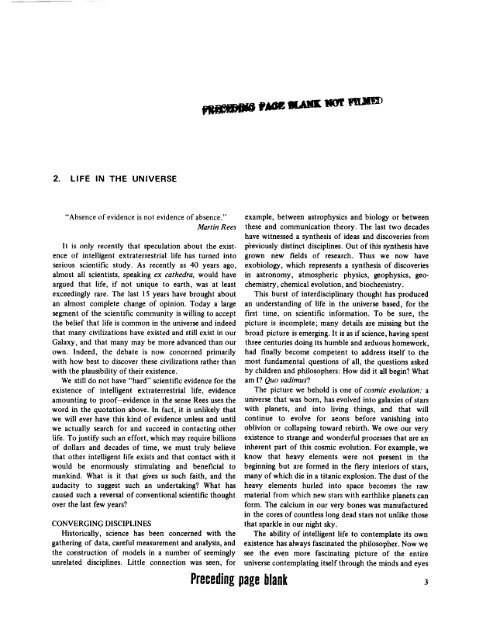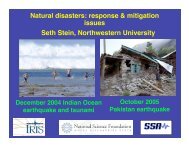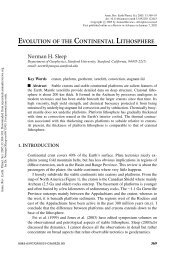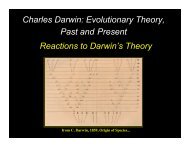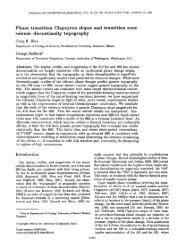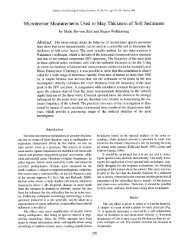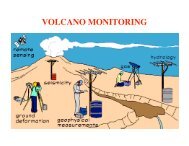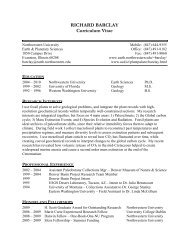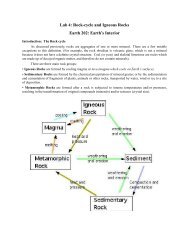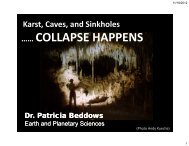Project Cyclops, A Design... - Department of Earth and Planetary ...
Project Cyclops, A Design... - Department of Earth and Planetary ...
Project Cyclops, A Design... - Department of Earth and Planetary ...
You also want an ePaper? Increase the reach of your titles
YUMPU automatically turns print PDFs into web optimized ePapers that Google loves.
llt,al<br />
10o lmJagD<br />
2. LIFE IN THE UNIVERSE<br />
"Absence <strong>of</strong> evidence is not evidence <strong>of</strong> absence."<br />
Martin<br />
Rees<br />
It is only recently that speculation about the existence<br />
<strong>of</strong> intelligent extraterrestrial life has turned into<br />
serious scientific study. As recently as 40 years ago,<br />
almost all scientists, speaking ex cathedra, would have<br />
argued that life, if not unique to earth, was at least<br />
exceedingly rare. The last 15 years have brought about<br />
an almost complete change <strong>of</strong> opinion. Today a large<br />
segment <strong>of</strong> the scientific community is willing to accept<br />
the belief that life is common in the universe <strong>and</strong> indeed<br />
that many civilizations have existed <strong>and</strong> still exist in our<br />
Galaxy, <strong>and</strong> that many may be more advanced than our<br />
own. Indeed, the debate is now concerned primarily<br />
with how best to discover these civilizations rather than<br />
with the plausibility <strong>of</strong> their existence.<br />
We still do not have "hard" scientific evidence for the<br />
existence <strong>of</strong> intelligent extraterrestrial life, evidence<br />
amounting to pro<strong>of</strong>-evidence in the sense Rees uses the<br />
word in the quotation above. In fact, it is unlikely that<br />
we will ever have this kind <strong>of</strong> evidence unless <strong>and</strong> until<br />
we actually search for <strong>and</strong> succeed in contacting other<br />
life. To justify such an effort, which may require billions<br />
<strong>of</strong> dollars <strong>and</strong> decades <strong>of</strong> time, we must truly believe<br />
that other intelligent life exists <strong>and</strong> that contact with it<br />
would be enormously stimulating <strong>and</strong> beneficial to<br />
mankind. What is it that gives us such faith, <strong>and</strong> the<br />
audacity to suggest such an undertaking? What has<br />
caused such a reversal <strong>of</strong> conventional scientific thought<br />
over the last few years?<br />
CONVERGING<br />
DISCIPLINES<br />
Historically, science has been concerned with the<br />
gathering <strong>of</strong> data, careful measurement <strong>and</strong> analysis, <strong>and</strong><br />
the construction <strong>of</strong> models in a number <strong>of</strong> seemingly<br />
unrelated disciplines. Little connection was seen, for<br />
example, between astrophysics <strong>and</strong> biology or between<br />
these <strong>and</strong> communication theory. The last two decades<br />
have witnessed a synthesis <strong>of</strong> ideas <strong>and</strong> discoveries from<br />
previously distinct disciplines. Out <strong>of</strong> this synthesis have<br />
grown new fields <strong>of</strong> research. Thus we now have<br />
exobiology, which represents a synthesis <strong>of</strong> discoveries<br />
in astronomy, atmospheric physics, geophysics, geochemistry,<br />
chemical evolution, <strong>and</strong> biochemistry.<br />
This burst <strong>of</strong> interdisciplinary thought has produced<br />
an underst<strong>and</strong>ing <strong>of</strong> life in the universe based, for the<br />
first time, on scientific information. To be sure, the<br />
picture is incomplete; many details are missing but the<br />
broad picture is emerging. It is as if science, having spent<br />
three centuries doing its humble <strong>and</strong> arduous homework,<br />
had finally become competent to address itself to the<br />
most fundamental questions <strong>of</strong> all, the questions asked<br />
by children <strong>and</strong> philosophers: How did it all begin? What<br />
am I? Quo vadimus?<br />
Preceding pageblank<br />
The picture we behold is one <strong>of</strong> cosmic evolution: a<br />
universe that was born, has evolved into galaxies <strong>of</strong> stars<br />
with planets, <strong>and</strong> into living things, <strong>and</strong> that will<br />
continue to evolve for aeons before vanishing into<br />
oblivion or collapsing toward rebirth. We owe our very<br />
existence to strange <strong>and</strong> wonderful processes that are an<br />
inherent part <strong>of</strong> this cosmic evolution. For example, we<br />
know that heavy elements were not present in the<br />
beginning but are formed in the fiery interiors <strong>of</strong> stars,<br />
many <strong>of</strong> which die in a titanic explosion. The dust <strong>of</strong> the<br />
heavy elements hurled into space becomes the raw<br />
material from which new stars with earthlike planets can<br />
form. The calcium in our very bones was manufactured<br />
in the cores <strong>of</strong> countless long dead stars not unlike those<br />
that sparkle in our night sky.<br />
The ability <strong>of</strong> intelligent life to contemplate its own<br />
existence has always fascinated the philosopher. Now we<br />
see the even more fascinating picture <strong>of</strong> the entire<br />
universe contemplating itself through the minds <strong>and</strong> eyes


